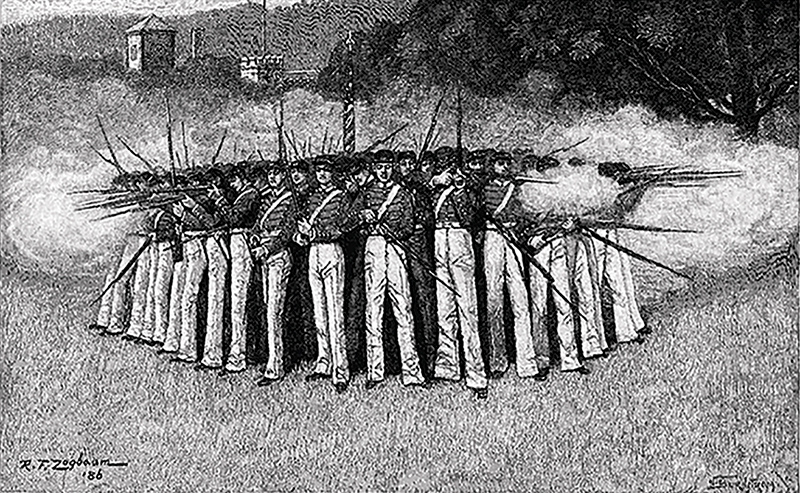In Henry IV, the king on his deathbed gives his son and heir the ancient advice dear to the hearts of rulers in dire straits at home:
I . . . had a purpose now
To lead out many to the Holy Land,
Lest rest and lying still might make them look
Too near unto my state. Therefore, my Harry,
Be it thy course to busy giddy minds
With foreign quarrels, that action, hence borne out,
May waste the memory of the former days.
Since the foundation of the American Republic there has been an endless procession of foreign quarrels with which giddy minds could have been busied. Until near the end of the nineteenth century the United States kept aloof from the wars of Europe, but frenetic preoccupation with foreign quarrels has now become an industry. Our universities have endowments for teaching what is called “international relations,” and since about 1918 a large part of this instruction has been stripped of all scientific pretensions and has been little more than propaganda for intervention by the United States in foreign controversies everywhere. Hundreds of professors lecture on their favorite theme—the duty of the United States to set the world aright. Associations for the “study” of foreign affairs, with millions of dollars at their disposal, are engaged in the same kind of propaganda, openly or under the guise of contemporary “scholarship.” The daily press, thriving on hourly sensations, inflames readers with a passion for putting down the wicked abroad. Brash young tom-tom beaters in journalism, who know no history beyond a few days ago, write books on the “inside” of this or that, directed profitably to the same end.
The ideology put forth to sustain the imperialist policy may be summarized as follows: America has grown up, has acquired man’s stature and put on long pants; America must put aside childish things, become a world power, build a monster navy, grab colonies, plunge into every dispute, and carry “civilization” to “backward” races. An army of literary artists supplied sentimental prose and poetry. Steel makers put sinews of war into the propaganda chest and pronounced it good for business. The middle classes applauded. Mighty men among the intelligentsia joined in full cry, damning opponents of imperialism as “white-livered cowards.” What a Roman holiday!

For a brief season the American people had enough jitters at home to keep their giddy minds away from foreign affairs, and they swept Franklin D. Roosevelt into office. His platform declared that “we shall continue to observe a true neutrality in the disputes of others.” But on October 5, 1937, Roosevelt called for action by all democracies against Germany, Italy, and Japan. He declared that if a holocaust came the United States could not avoid it, appealing to “the peace-loving nations” to put a quarantine on aggressors. The will of the country to stay out of foreign wars had been too strong. That will would have to be crushed.
It is folly for the United States to embark on a vast program of world pacification. We can enjoy the luxury of hating certain nations. We can indulge in the satisfaction that comes from contemplating a war to destroy them. But it would be wiser to suggest that those countries which are immediately menaced by Germany and Italy put aside their enmities and join in a combination of their own. If countries whose very existence seems at stake will not unite for self-protection, how can the United States hope to effect a union among them? After temporary pacification, what? After war, what? After peace, what?
Some of our fellow citizens do not believe that America can deny the obligation of directing world destiny. Walter Lippmann says that America is to be “what Rome was to the ancient world.” These are glistening, masculine words. Rome conquered, ruled, and robbed, then crumbled to ruins. Does anybody in his right mind really believe that the United States ought to play that role?
From “Giddy Minds and Foreign Quarrels,” which appeared in the September 1939 issue of Harper’s Magazine.





































































































































